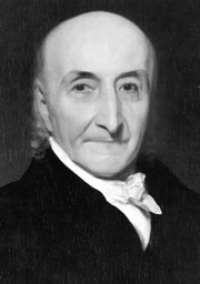On this date in 1761, Albert Gallatin (né Abraham Alfonse Albert Gallatin) was born in Geneva, Switzerland. He studied mathematics, natural history and Latin at Geneva University, where he graduated with honors in 1779. Voltaire had been a friend of his grandmother and was an influence on Gallatin, also a deist. In 1780, to evade family pressure to join up with the Hessians, Gallatin gave up family and fortune to emigrate to America to demonstrate “a love for independence in the freest country of the universe.”
He taught French at Harvard, then moved to Virginia in 1785, where he was elected to the legislature. After being elected to the U.S. Senate, Gallatin was rejected by the body as a non-citizen, but returned to Congress in the House in 1795. He wrote “Views of the Public Debt, Receipts & Expenditures of the U.S.” in 1800, which is described by the U.S. Department of the Treasury website as “still a classic” analysis of the fiscal operations of government under the Constitution.
Jefferson believed the Alien and Sedition Act was framed to drive Gallatin — who worked to keep down expenses, especially for war and the military — from office. Jefferson offered Gallatin the position of secretary of state. He served under both Jefferson and Madison from 1801-13. He was minister to France from 1815-23, then served as an envoy to Great Britain. A lifelong scholar, he was a co-founder of New York University.
Determined to keep it secular, he later resigned from a position there when “a certain portion of the clergy had obtained control.” Gallatin opposed slavery and helped negotiate the Treaty of Ghent, ending the War of 1812. He served with the American Ethnological Society, helping to preserve native languages, and was president of the New York Historical Society. (D. 1849)


